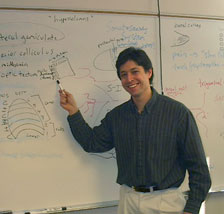- RESEARCH
- TEACHING
- PUBLICATIONS
- LINKS
- PERSONAL
Teaching and Courses
Overview
Currently, I am responsible for teaching Physiological Psychology (PSY 326) and The Brain-Behavior Connection (PSY 221M). I also expect to offer sections of Introduction to Psychology (PSY 101) as well as bring some new courses to the Rollins Psychology curriculum.
For example, in the past I have participated in a team-taught Neuroscience course, as well as teaching Neural Plasticity, Psychobiology Research, and The Psychobiology of Consciousness. In addition, I have long considered developing additional courses, including: Behavioral Neurobiology (or "Neuroethology"), Neuropsychology, and The Psychology of Eating. Student interest will be important in helping to decide which new courses I offer, so I look forward to hearing from Rollins students!
Current versions of my syllabi are available below along with the most recent syllabi from courses I have not yet offered at Rollins:
- Physiological Psychology
- The Brain-Behavior Connection
- The Psychobiology of Consciousness
- Neural Plasticity
- Psychobiology Research
Course Descriptions
Physiological Psychology
Physiological psychology is the study of the mind and behavior using biological methods. While most experimental branches of psychology study mind and behavior by manipulating the environment of the organism, physiological psychologists may manipulate the organism itself. This very powerful approach has provided a great deal of information about classic psychological issues like sensation and perception, motivation, emotion, attention, learning and memory, language, and even consciousness. This course surveys broadly the contributions of the biological approach to psychology.
This course is also two for the price of one: in addition to learning more about psychology, it will be necessary to learn quite a bit of biology. Particularly the first part of the course and much of the lab work will deal with neuroanatomy and neurophysiology. In my opinion, many textbooks in this field (and many researchers as well) make the mistake of emphasizing the biological or medical fruits of physiological psychology. Our emphasis will be on psychology. On the other hand, I personally feel it is unconscionable for a student of psychology to be ignorant of neural processes, virtually regardless of their eventual focus in psychology. So we will aim to obtain a basic understanding of neural biology as well.
The Brain-Behavior Connection
The Brain-Behavior Connection is an introductory course to the fields of neuroscience and physiological psychology. It is intended to be less intensive than, but contextually similar to, my physiological psychology course. In order to distinguish this course from that one, we will focus on somewhat different topics. In particular, we will focus in this course on the relationship of brain to psychological topics that are particular (or more germane) to humans: drug abuse, language, psychological disorders, dreams, and consciousness. Physiological psychology will concentrate on more general themes including sensory systems and homeostasis. Additionally, though, we will cover basic principles of neuroscience, including what neurons are and how they function.
Psychobiology Research
A course designed to explore the methods used by psychobiologists. For those that can be taught in the research lab, this exploration will be largely hands-on. For more sophisticated methods (e.g., multielectrode recording) or those unavailable to us (e.g., functional magnetic resonance imaging), the exploration will be through reading the literature. During the latter half of the course, students participate in small group projects.
Neural Plasticity
While psychobiology is often conceived as the role of the brain in producing behavior, this course explores a large literature on the role of behavior in producing the brain. That is, the physiology and neuroanatomy of the brain is organized by behavior and environmental input, and the brain itself (ironically once thought to be the least-modifiable organ in the body) changes throughout life as the result of experience. Topics in this course include the development of the nervous system, the role of sensory experience in fine-tuning neural connections during development, the plasticity of the adult brain following injury, brain changes as a function of environmental input, and cross-modal plasticity, such as the role of visual area in Braille reading in the blind.
The Psychobiology of Consciousness
We will examine scientific approaches to the mind-body problem: that is, how physical tissue gives rise to subjective, qualitative, and unified consciousness. Beginning with thought experiments from philosophy, we will consider the contributions of philosophers, psychologists, physicists, and neuroscientists to both the "easy" and "hard" problems of consciousness.
The Psychology of Eating
With a focus on the physiology of eating and the physiological psychology of ingestive behavior, this course would also broadly explore the psychology of eating from multiple levels, and explore topics such as obesity, eating disorders, and the prolongation of life span by caloric restriction.
Behavioral Neurobiology
A neuroethology course, which examines the cellular bases of clearly-defined, species-specific behaviors such as bat echolocation, catfish gustation, locust flight, and sea slug escape behaviors.
Neuropsychology
The science of learning about normal psychology by studying abnormal cases. Neuropsychology explores the behavior of humans with aphasia, sensory loss, amnesia, and other deficits that are often the result of central nervous system damage.
